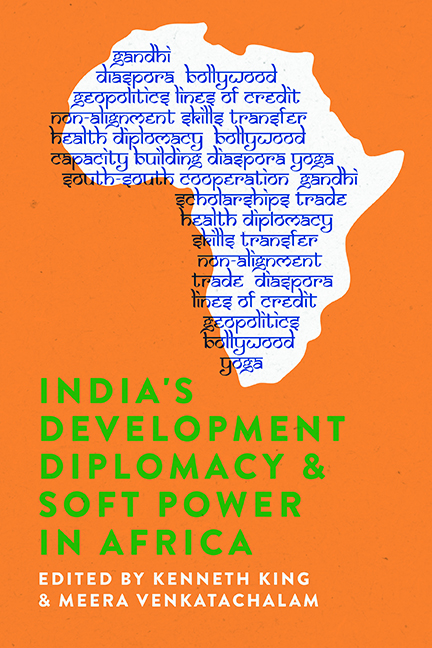Book contents
- Frontmatter
- Contents
- Notes on Contributors
- Acknowledgements
- List of Abbreviations
- Glossary
- Introduction: India–Africa Now: Changing Imaginaries and Knowledge Paradigms
- Part 1 The Geopolitical Imaginary and Soft Power
- Part 2 The Indian Political Right and the Reconfiguration of Soft Power in Africa
- Part 3 Capacity Building: Shifting Modalities and New Knowledgescapes
- Part 4 Skilling, Knowledge Transfer and Indo-African Interactions
- Conclusion: Reflections on India–Africa Studies, Development Cooperation and Soft Power
- Index
8 - Precarious Partnerships: Tanzanian Entrepreneurs of Asian and African Descent
Published online by Cambridge University Press: 26 May 2022
- Frontmatter
- Contents
- Notes on Contributors
- Acknowledgements
- List of Abbreviations
- Glossary
- Introduction: India–Africa Now: Changing Imaginaries and Knowledge Paradigms
- Part 1 The Geopolitical Imaginary and Soft Power
- Part 2 The Indian Political Right and the Reconfiguration of Soft Power in Africa
- Part 3 Capacity Building: Shifting Modalities and New Knowledgescapes
- Part 4 Skilling, Knowledge Transfer and Indo-African Interactions
- Conclusion: Reflections on India–Africa Studies, Development Cooperation and Soft Power
- Index
Summary
Introduction
In his chairpersonship address to the then Dar es Salaam Merchant Chamber in 1964, M.M. Diwani, a Tanzanian businessman of Asian origin, presented radical proposals for redressing the historical imbalance between businesspeople of Asian and African descent. Among other things, he announced initiatives for imparting skills to, and partnering with, Africans. Mwafrika i.e. African, a Kiswahili newspaper, received this groundbreaking news with much excitement. ‘Waasia wenye Maduka wataka Umoja na Waafrika’ (‘Asian shop owners want Unity with Africans’) it stressed in its headline (Ripota Wetu 1964: 1).
On the following day, its editorial, entitled ‘Upatna wa Waasia na Waafrika’ (Partnership between Asians and Africans), also extolled such a long overdue need for the transfer of skills (Mwafrika 1964: 2). The editors saw it, albeit cautiously, as a new dawn for Tanzanians who considered themselves indigenous Africans and those who, through historic migration from South Asia to Tanzania, became citizens of the newly established African nation state. For them, it potentially ushered in a new era in which the two groups would identify with each other. Also known as the Indian subcontinent, this point of their origin marked the identity of the latter group to the extent that the Kiswahili terms mhindi for Indian came to be used interchangeably and even stereotypically with muasia for Asian (Delf 1963; Ghai and Ghai 1965; Mangat 1969; Tandon and Raphael 1984; Nagar 1995; Seidenberg 1996; Himbara 1997; Heilman 1998; Ranja 2003; Oonk 2013; Bishara 2017). This has been the case although some of them are not necessarily Indians in terms of originating from India.
More than half a century later, it appears that the transfer and partnership either did not occur or has not been sustainable over generations. ‘I have written and spoken widely about this phenomenon,’ a top African entrepreneur, Ali A. Mufuruki, stated, ‘I don't know of any African Tanzanian who has grown as an entrepreneur from working closely with Indians’. He was responding to our question on whether he was aware of knowledge, technology or skills transfer from Tanzanians of Asian origin to those of African origin that facilitated business start-ups. ‘The opposite’, he concluded, ‘seems to be true in the majority of cases.’
Similarly, a former chair of the parliamentary committee responsible for accounts of public companies, Zitto Kabwe, affirmed that there is no such thing.
- Type
- Chapter
- Information
- India's Development Diplomacy and Soft Power in Africa , pp. 155 - 168Publisher: Boydell & BrewerPrint publication year: 2021



